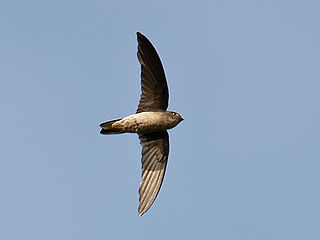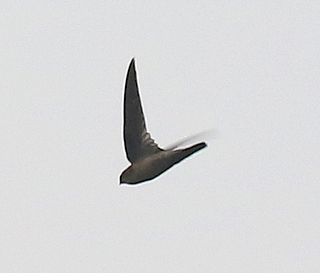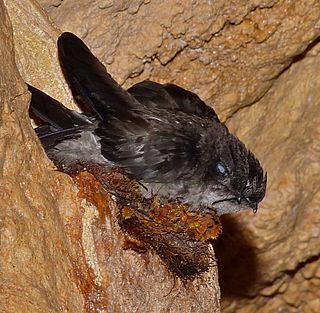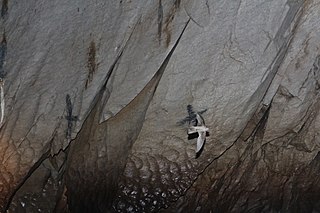 W
WAerodramus is a genus of small, dark, cave-nesting birds in the Collocaliini tribe of the swift family. Its members are confined to tropical and subtropical regions in southern Asia, Oceania and northeastern Australia. Many of its members were formerly classified in Collocalia, but were first placed in a separate genus by American ornithologist Harry Church Oberholser in 1906.
 W
WThe Atiu swiftlet is a species of bird in the swift family, endemic to Atiu in the Cook Islands.
 W
WThe Australian swiftlet is a small bird belonging to the genus Aerodramus in the swift family, Apodidae. It is endemic to Queensland in north-eastern Australia. It was formerly included in the white-rumped swiftlet but is now commonly treated as a separate species. It has two subspecies which are occasionally regarded as two separate species: A. t. terraereginae and A. t. chillagoensis.
 W
WThe black-nest swiftlet is a species of swift in the family Apodidae. It is found in Brunei, Indonesia, Malaysia, Myanmar, the Philippines, Singapore, Thailand, and Vietnam. Its natural habitats are subtropical or tropical moist lowland forest and subtropical or tropical moist montane forest.
 W
WThe edible-nest swiftlet, also known as the white-nest swiftlet, is a small bird of the swift family which is found in South-East Asia. Its opaque and whitish nest is made exclusively of solidified saliva and is the main ingredient of bird's nest soup, a delicacy of Chinese cuisine.
 W
WGermain's swiftlet is a species of swift.
 W
WThe Himalayan swiftlet is a small swift. It is a common colonial breeder in the Himalayas and Southeast Asia. Some populations are migratory.
 W
WThe Indian swiftlet, or Indian edible-nest swiftlet, is a small swift. It is a common resident colonial breeder in the hills of Sri Lanka and south west India.
 W
WThe island swiftlet, also known as the Caroline swiftlet, Micronesian swiftlet, or Caroline Islands swiftlet, is a species of swift in the family Apodidae. Some taxonomists consider it to be a subspecies of the uniform swiftlet. It is endemic to the Caroline Islands, and its natural habitat is subtropical or tropical moist lowland forests.
 W
WThe Mascarene swiftlet is a species of swift in the family Apodidae. It is found in Mauritius and Réunion, and the populations on the two islands have recently been confirmed to differ subspecifically. The nominate race francicus is found on Mauritius and the recently described race saffordi occurs on Réunion. Its natural habitats are subtropical or tropical moist lowland forest, subtropical or tropical high-altitude shrubland, subtropical or tropical high-altitude grassland, caves, arable land, and heavily degraded former forest. It is threatened by habitat loss.
 W
WThe mossy-nest swiftlet is a species of swift in the family Apodidae. Some taxonomists consider it to be a subspecies of the uniform swiftlet. It is found in northern Borneo, the Natuna and the Derawan Islands and Nias island off western Sumatra. Its natural habitat is subtropical or tropical moist lowland forests.
 W
WThe Palau swiftlet is a species of swift in the family Apodidae. It is endemic to Palau.
 W
WThe Palawan swiftlet is a species of swift in the family Apodidae. Some taxonomists consider it to be a subspecies of the uniform swiftlet. It is endemic to the Philippines. It uses echolocation to navigate and hunt in the darkness.
 W
WThe Seychelles swiftlet is a small bird of the swift family. It is found only in the Seychelles Islands in the Indian Ocean.
 W
WThe uniform swiftlet,, also known as the Vanikoro or lowland swiftlet, is a gregarious, medium-sized swiftlet with a shallowly forked tail. The colouring is dark grey-brown, darker on the upperparts with somewhat paler underparts, especially on chin and throat. This species is widespread from the Philippines through Wallacea, New Guinea and Melanesia. It forages for flying insects primarily in lowland forests and open areas. It nests in caves where it uses its sense of echolocation, rare in birds, to navigate.
 W
WThe white-rumped swiftlet is a species of swift in the family Apodidae.